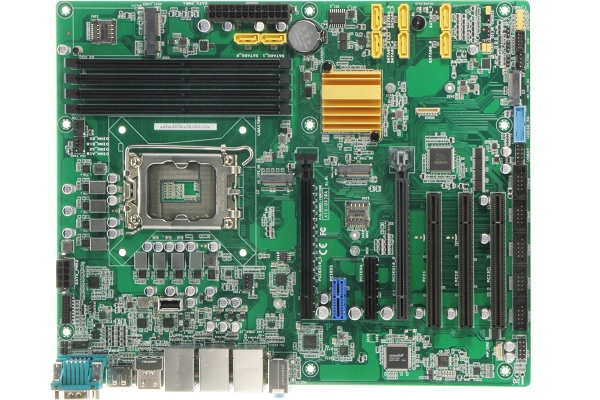Choosing the Right Rackmount Server Case: A Guide to 1U to 4U Sizes for Industrial Applications
- Rohit Sharma
- May 17
- 4 min read

When it comes to building a robust and scalable computing environment, the server case you choose is as important as the hardware inside. Whether you're setting up a compact data center or deploying industrial automation equipment, selecting the appropriate rackmount chassis—from 1U to 4U rackmount chassis, can significantly impact your system’s performance, cooling, and expansion capabilities.
In this guide, we’ll break down everything you need to know about 1U to 4U rackmount sizes and help you decide which rackmount server case best suits your industrial or enterprise-level requirements.
Understanding Rackmount Server Sizes: What Does “U” Mean?
Rackmount server cases are measured in rack units (U). One “U” is equivalent to 1.75 inches in height. This measurement defines how much vertical space a server chassis occupies in a standard 19-inch server rack. So:
1U = 1.75 inches high
2U = 3.5 inches high
3U = 5.25 inches high
4U = 7 inches high
Choosing between these sizes depends on your hardware requirements, airflow, and the amount of space available in your server rack.
Key Factors to Consider When Choosing a Rackmount Server Case
Before we jump into the specifics of each unit size, let’s consider the core factors that affect your selection:
Hardware Compatibility: Does the chassis support full-sized GPUs, RAID controllers, or extended ATX motherboards?
Cooling Requirements: Higher performance systems require better cooling, and more space allows better airflow.
Expansion & Scalability: Think about future upgrades—can the chassis accommodate more drives or PCIe cards?
Environment: Are you operating in a harsh industrial setting? Then a rugged, industrial rackmount chassis is essential.
1U Rackmount Server Case: Compact and Efficient
Best for: Space-constrained environments, light workloads, and edge computing
The 1U chassis is the smallest standard rackmount server case, ideal for businesses needing a lightweight and compact solution. These are typically used for firewalls, small-scale web hosting, and monitoring systems.
However, due to their low profile, 1U servers have limited internal space for cooling and expansion. This makes them less suitable for high-performance industrial applications.
Not recommended for environments needing high-performance CPUs or multiple GPUs.
2U Rackmount Server Case: Balanced Performance

Best for: SMEs, web servers, and moderate industrial applications
A 2U rackmount chassis offers more flexibility than 1U. It provides better airflow, supports more storage devices, and allows the integration of larger CPU coolers or compact GPU cards.
For businesses incorporating industrial single board computers or deploying systems in environments requiring moderate processing power, a 2U case can serve as a cost-effective, scalable solution.
3U Rackmount Server Case: Advanced Industrial Integration
Best for: Media servers, hybrid industrial workstations, and advanced computing
With additional vertical space, a 3U industrial computer chassis offers ample room for larger motherboards, extended GPUs, and hot-swappable drive bays. This makes it a strong contender for complex computing tasks such as video rendering or machine learning.
For industrial applications, this size supports advanced configurations for industrial rack computers, which are often deployed in manufacturing plants, oil and gas sectors, and remote monitoring stations.
4U Rackmount Server Case: Ultimate Flexibility and Power

Best for: High-performance computing, industrial automation, and data-intensive environments
The 4U rackmount chassis is the gold standard for power users and industrial installations. It provides the maximum space for expansion, optimal airflow, and the ability to mount powerful GPUs, multiple drives, and specialized cooling systems.
In industrial environments, a 4U industrial rackmount chassis is often paired with fanless PCs or ruggedized industrial single board computers, designed to withstand high temperatures, dust, and vibration. This makes it ideal for automation control systems, AI workloads, and high-availability applications.
Why Industrial-Grade Chassis Matter
Unlike standard server cases, industrial computer chassis are built for resilience. They typically feature:
Shock- and vibration-resistant construction
Advanced dust filtration systems
Long-life components
Redundant cooling and power systems
This is crucial for maintaining uptime in challenging environments like manufacturing plants, mining sites, or transportation hubs.
Additionally, industrial rack computers often include features like remote monitoring, secure mounting options, and easy field serviceability—ensuring long-term value and operational efficiency.
Fanless PC and Thermal Management in Industrial Settings
Thermal control is a major consideration in server environments. In locations where dust, debris, or high ambient temperatures are a concern, a fanless PC can be integrated into a rackmount chassis to reduce maintenance and improve system longevity.
Fanless systems dissipate heat through conductive materials like aluminum heatsinks, eliminating moving parts and reducing potential failure points. When combined with a 4U industrial rackmount chassis, these systems can run silently and efficiently even in harsh conditions.
Final Thoughts: Making the Right Choice
Choosing the right rackmount server case—whether it’s a compact 1U model or a fully expandable 4U rackmount chassis—depends heavily on your specific application, environmental challenges, and long-term growth plans.
Here’s a quick recap:
Size | Ideal For | Key Benefit |
1U | Lightweight tasks, space-saving | Compact footprint |
2U | Moderate computing, general industrial use | Balance of space and airflow |
3U | Mixed workloads, GPU integration | Expansion and flexibility |
4U | Industrial automation, AI, HPC | Maximum scalability and rugged performance |
For our clients involved in industrial automation equipment, oil & gas, or transportation, we typically recommend opting for a 4U industrial computer chassis to ensure sufficient power, resilience, and expandability.
Whether you're integrating an industrial single board computer, building a fanless PC, or deploying a full industrial rack computer solution, the right chassis serves as the foundation of your infrastructure. Don’t compromise on it.
Need Help Choosing? As a digital partner specializing in industrial tech solutions, we help organizations optimize their hardware setups for performance, durability, and future scalability. Connect with our team to receive tailored recommendations based on your application, environment, and long-term goals.





Comments